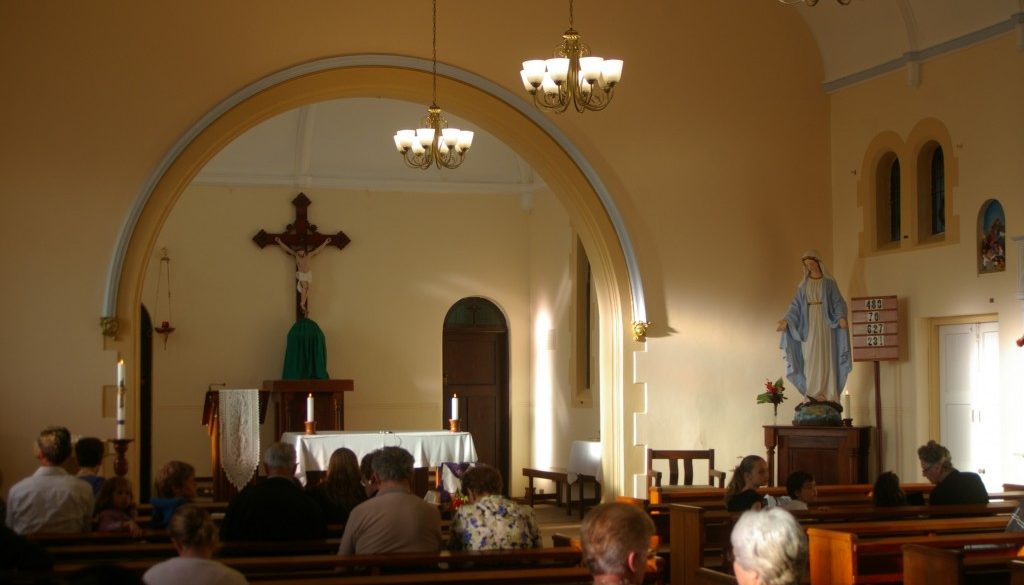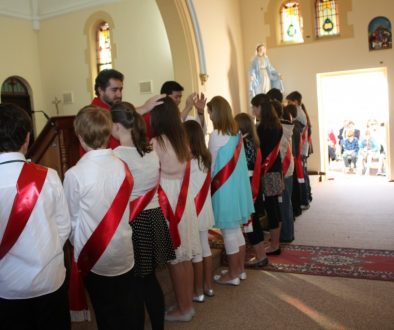Reconciliation
 Those who approach the sacrament of Penance obtain pardon from God’s mercy for the offense committed against him, and are, at the same time, reconciled with the Church which they have wounded by their sins and which by charity, by example, and by prayer labors for their conversion.
1422 Catechism of the Catholic Church
Those who approach the sacrament of Penance obtain pardon from God’s mercy for the offense committed against him, and are, at the same time, reconciled with the Church which they have wounded by their sins and which by charity, by example, and by prayer labors for their conversion.
1422 Catechism of the Catholic Church
The Sacrament of Reconciliation, often known simply as “confession” is God’s Ocean of Mercy, Forgiveness and Healing, the grace of which is little understood in our time. Many people are often afraid of it, do not understand it, neglect it, see it as of no consequence, have had negative experiences of it, do not know how to go about it or have hardly matured in the practice of it since their childhood “First Confession”.
Often the same list of sins is hurriedly rattled off and people find themselves living no differently after their confession than they were before. Going to Confession helps us to ensure that we are not being lazy in our relationship with God. It is a time to be really honest with God. This is an invitation to us to think again and to return to the Sacrament more frequently with a renewed understanding of it.nbsp;
[learn_more caption=”Why do we need Confession?”]
God loves us and longs to heal us and set us free. This He does when we turn to Him and tell Him of our sins. The awareness of personal sin is our starting point. “Yes, I am disordered; there is sin in my life, but other factors have affected me.:
Forgiveness
God forgave each one of us through His Son Jesus, when He suffered and died in expiation for our sins, from the Cross. He invites us to come to Him and acknowledge our sinfulness, thereby making the blood of Jesus our healing remedy and our source of salvation. Confession is the means of receiving this forgiveness, by the direct touch of Jesus through His body the Church.
Healing
What is healed? Our guilt and sin are forgiven. We hope for healing of the wound caused by our own sins and those of others. The wounds of sin are wounds we carry within, and their pain is often crushing and crippling. They can lead us into sinful, compulsive actions and behaviours, hurtful to others and to ourselves. Confession provides an opportunity to ask for help and healing in these areas.
…”Just as the wounds of sin are varied and multiple in the life of the individual and the community, so too the healing which penance provides is varied…” (New Rite of Penance no 7.)[/learn_more]
[learn_more caption=”What is involved in making a confession?”]
Preparation through prayer, examination of conscience and sorrow for sin.
What is a sin?
Sin is any wilful, desire, word, action or omission forbidden by the law of God. It inflicts a wound not only on the sinner but also on one’s neighbour and the whole Church. There are two kinds of sin, original sin (forgiven through Baptism) and actual sin (forgiven through genuine sorrow, often with Confession).
Actual sin is every sin which we ourselves commit. actual sin is either:
- Mortal sin, involving a serious matter to which we give full, free, deliberate consent which deprives us of the Life of Christ and which, unrepented, would mean hell; or
- Venial sin involving serious matters to which we consent without full deliberation, or the everyday compromise, unloving deeds, decisions and attitudes we have made. How often do we hear Jesus say to us, “Why have you persecuted me?” Venial sin is the gateway to mortal sin. We are bound to confess to a priest each and every mortal sin of which we are aware, in order to receive forgiveness. This is the teaching of the Church. St. Paul tells us to, “Be very careful about the sort of lives you lead…” (Eph 5:15)
Sorrow
Expression of sorrow and contrition are an essential part of the path towards reconciliation with God, our neighbour and the Church. It is here we may change our lives and repair the damage, scandal, pain and hurt we have caused. Often confession only touches the surface of our lives, whilst our souls are sick due to lack of truth about ourselves and the effects our sins have on others. Superficial healing follows superficial sorrow, focused on how our sin hurt us rather than how it hurt Christ in others. True sorrow and consequent determination to change deepens healing.
“…Frequent confession helps us grow in genuine self-knowledge, humility, bad habits are corrected, spiritual neglect and tepidity are resisted, attained…”
(Pius XII Mystici Corporis. 1945).[/learn_more]




